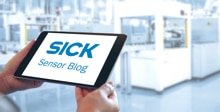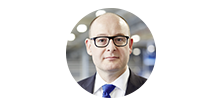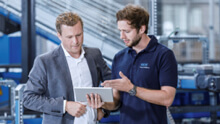Everybody’s talking about Industry 4.0 but few know what it is all about. Bernhard Müller, responsible for Industry 4.0 on the Management Board, and Dr. Kay Fürstenberg, Manager of the Central Research & Development Department, use an interview to explain the opportunities and challenges of the fourth industrial revolution.
What is the significance of sensors for the success of Industry 4.0?
Bernhard Müller: Industry 4.0 describes the complete digitalization of production and logistics. In the not-too-distant future, machines will operate autonomously and be able to optimize themselves. This is impossible without intelligent sensors – they are the eyes and ears of such machines.
Dr. Kay Fürstenberg: Intelligence in the sensor, as we have been implementing consistently in ever-increasing numbers of product designs since 2004, is the key to Industry 4.0. Customers will no longer simply buy a sensor, but a device that uses its greater computing and storage capacities to prepare a diverse range of sensor data to provide information. Thus, in addition to controlling machines, they will also prepare suggestions for optimizing production processes, for example.
What exactly is meant by the term ‘intelligence’?
Bernhard Müller: A major aspect for the intelligence in our sensors is SICK’s system competence and our application experience in numerous sectors. This is not just a unique selling point, but also provides proof of our technological edge: we currently have the broadest portfolio of all suppliers.
Dr. Kay Fürstenberg: Sensors can only be lifted to the next level by linking application knowledge with the flexibility of modern software architectures – and thus creating the possibility of processing data within the sensor and in the cloud. The intelligent sensor is, so to speak, the gateway to the world of Industry 4.0.
To what extent has Industry 4.0 already been implemented?
Dr. Kay Fürstenberg: The topic is at the very top of the industrial agenda. No factory has yet been able to fully implement Industry 4.0. But various flagship projects at universities, institutes, and in industry clearly show the added value that can be achieved when production and logistics are more transparent and offer greater flexibility and convertibility.
Bernhard Müller: I am convinced that nobody now plans a new factory without considering the ideas and aims of Industry 4.0. It will be interesting when these ideas are integrated in existing production or logistical structures. Companies want to use such an upgrade to enter a new world, though without leaving behind proven systems, such as existing machines. This is where sensors offer access to both worlds: the old world of controller communication and the new world of cloud computing.
Dr. Kay Fürstenberg: In the final expansion stage, Industry 4.0 will really not need any central control systems anymore. Control functions will then be locally implemented through intelligent networked sensors and actuators. It is already the case that functions can be carried out on two levels: those that require real time are implemented in the sensor, while particularly computing- and time-intensive functions are executed on networked computers – and ultimately this is exactly what the cloud is.

What does Industry 4.0 mean for SICK as a participant in the market?
Dr. Kay Fürstenberg: Industry 4.0 allows the merging of the physical and virtual worlds in production and logistics to create so- called cyber-physical systems that communicate within a highly networked environment via the Internet of Things (IoT). Intelligent sensors and sensor systems, in particular, provide the necessary data. Users can further process, sort and evaluate the data at higher-ranking levels. This creates transparency in the processes and, together with the collective application knowledge which SICK possesses, this gives us the enormous opportunity to open up new business fields with the help of smarter data analyses.
Bernhard Müller: Thanks to SICK’s strategically organized management of key industries it really has built up a level of specialist expertise unparalleled in the sector. Moreover, for many years we have been implementing projects in our own production and logistics that are oriented upon the ideal of Industry 4.0 – the smart factory. We are in the process of completely converting an assembly line in Waldkirch to Industry 4.0. All this makes us a premium partner that can competently support its customers in the implementation of Industry 4.0.
What risks are associated with these opportunities?
Bernhard Müller: It is of decisive importance for companies that they have control over their own data anywhere and anytime. There must also be rules for when a company uses external data, or its own data is located in an external cloud. Industry 4.0 will not succeed without such a regulatory system. This is why SICK is actively engaged in the Industrial Data Space Association and, indeed, was one of its founding members. The security of the exchange of data between certified participants is one of the Association’s most important tasks.
Dr. Kay Fürstenberg: It is all about digital sovereignty. So only companies that are certified by the Industrial Data Space Association can participate in an exchange of data. They have full control over their data in the cloud, and autonomously decide who may use the data when, how, and for how long. The necessary trust can only be created with such uniform and transparent models for ownership and use, as well as efficient hierarchical security precautions. This network will therefore become the basis for data-based services that will also considerably expand our business model in the long run.
To what extent will new work scenarios be created?
Bernhard Müller: Work will be distributed differently and with considerably more value creation when the ideas and structures of Industry 4.0 have been integrated in production and logistics. It is already more and more often the case that robots carry out heavy or harmful work, for example. And increasingly robots are not found operating isolated behind a protective barrier, but working in collaboration with humans – thanks to intelligent and networked safety sensors.
Dr. Kay Fürstenberg: Human-robot collaboration creates a new quality of jobs that require well-trained specialists. There will be new tasks of a far less preparative or implementing character, but that require decision-making competences, in particular. Because this is something that humans are especially good at.
What must happen for Industry 4.0 to acquire further impetus?
Dr. Kay Fürstenberg: The human imagination is frequently a limiting factor, particularly when it comes to considering everything that one could achieve with smart data. New ways of thinking are just as necessary as seeing the big picture. At the same time, however, one must also know where the users’ problems lie. We will only be able to open up paths to new business fields (and exploit them with rapid profitability) when all these aspects come together.
Bernhard Müller: One obstacle is undoubtedly the often risk-shy attitude found in industry and among potential investors. At the same time, it is necessary to accept that not every project will immediately lead to a rewarding business idea. Without creativity, and above all without capital, Industry 4.0 will only make very gradual advances in economic terms.
What experience have you gained at SICK in this regard?
Dr. Kay Fürstenberg: We at SICK are most certainly excellently positioned. The company has been investing about ten percent of its turnover in research and development for years now. At the same time, we place great worth on free-thinking. This is the prerequisite for creatinve research and development. The wealth of networked expertise within the company accompanies our ideas along the path to innovation.
Bernhard Müller: Industry 4.0 requires staying power among those who implement it, as well as among those who supply the appropriate technologies. In concrete terms, this means long-term dependability regarding aims and decisions on the part of the company. The path must be predictable and clearly defined – a hesitant approach would not lead to success. SICK meets these prerequisites absolutely.


